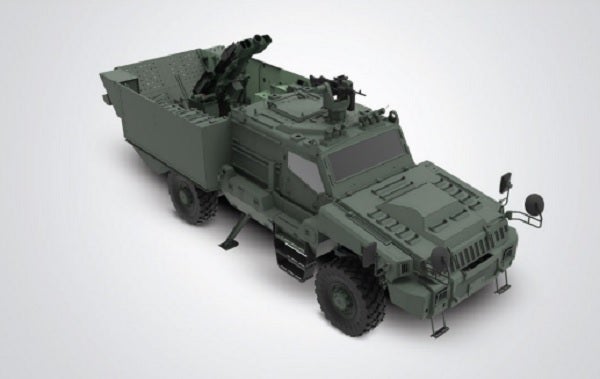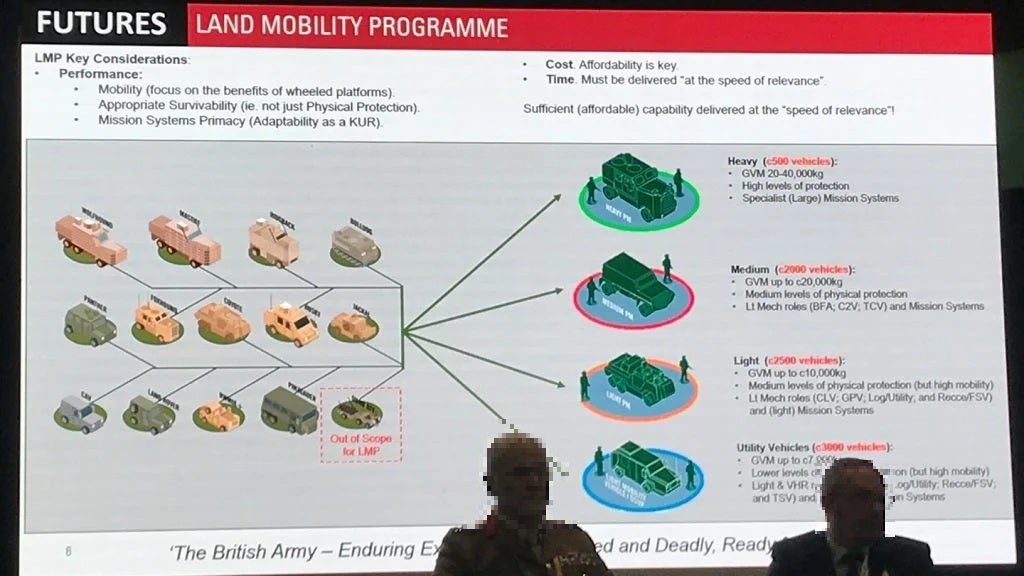
The signing of an agreement between Babcock and ST Engineering to collaborate on land domain technologies, with an initial focus on mortar systems, indicates a potential future offering to the British Army in the form of a light vehicle-mounted mobile fires capability.
Announcing the agreement on 5 March 2024, officials from Babcock and ST Engineering stated the companies would pursue defence opportunities “in markets of joint interest” that will see the combination of Babcock’s “close working relationship with the British Armed Forces” with ST Engineering’s “world-leading land systems products”.
ST Engineering offers two main land mortar capabilities: the Ground Deployed Advanced Mortar System (GDAMS), and the MkII 120mm Super Rapid Advanced Mortar System (SRAMS).

Illustrations of the SRAMS system by ST Engineering show a vehicle mounted 120mm mortar solution, fitted to a 4×4 vehicle with an open flatbed at its rear, providing a 10km fires range. The development of a 120mm mortar offering for any UK requirement is understood to include onshoring ambitions.
One possible combination of the Babcock-ST Engineering agreement could see a 120mm mortar such as the SRAMS teamed with an HMT 6×6 Jackal 3, designed by Supacat and currently being manufactured by Babcock and Supacat for the British Army.
British Army seeking mobility and firepower
The British Army is seeking to increase its mobile firings options through programmes such as the Mobile Fires Platform programme, which is seeking to replace the remaining ageing AS90 155mm artillery systems with either a tracked solution such as Hanwha’s K9 Thunder, or a wheeled howitzer.
How well do you really know your competitors?
Access the most comprehensive Company Profiles on the market, powered by GlobalData. Save hours of research. Gain competitive edge.

Thank you!
Your download email will arrive shortly
Not ready to buy yet? Download a free sample
We are confident about the unique quality of our Company Profiles. However, we want you to make the most beneficial decision for your business, so we offer a free sample that you can download by submitting the below form
By GlobalDataBabcock is part of a wider group of companies, including BAE Systems, that is promoting an Archer-based wheeled 155mm solution for the British Army, which was selected in March 2023 to provide an interim artillery capability.
The addition of a 120mm mobile mortar offering, fitted to a common vehicle platform, would provide the British Army with improved short-medium range fires capability, joining the current 155mm AS90/Archer, and 105mm light gun offerings.
In addition, as part of its consolidation efforts, the British Army could seek to reduce 16 vehicle types currently in service in the mobility fleet down to around five designs under the Land Mobility Programme (LMP).

In-service platforms that will be part of this consolidation effort include the Wolfhound, Mastiff, and Ridgeback protected mobility platforms, the Panther and Foxhound 4x4s, the tracked Bulldog FV430, as well as utility platforms such as the Land Rover and Pinzgauer.
Overall platform numbers being sought under the LMP effort are still being refined, but information disclosed in 2023 showcased four main categories of platforms being sought – Heavy (~500 vehicles), Medium (~2000 vehicles), Light (~2500 vehicles), and Utility (~3000 vehicles) – for a potential total of around 8,000 vehicles.
Babcock showcases General Logistics Vehicle
Babcock has also developed a General Logistics Vehicle (GLV), which sees the standard pickup vehicle from Japanese manufacturer Toyota adapted for military use, including military-grade seating, increased roof height, and the ability to carry a Nato pallet in the rear bed. Around 300 hours of work is required to complete the conversion.
A system such as the GLV could be offered as a solution for the Utility element of the LMP, or the Light Tactical Mobility Platform (LTMP) Medium and LTMP Light programme, through which the MoD is currently seeking industry responses to the potential purchase of more than 1,000 4×4 and all-terrain vehicles, valued at a combined total of £91.3m ($113.8m).
Meanwhile, Babcock could seek to extend its initial build of 69 Jackal 3 6×6 vehicles for the British Army with an additional 80 units, while also slowing down delivery in order to keep the newly-created production line open and active.



